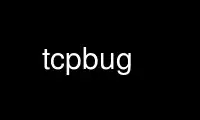
This is the command tcpbug that can be run in the OnWorks free hosting provider using one of our multiple free online workstations such as Ubuntu Online, Fedora Online, Windows online emulator or MAC OS online emulator
PROGRAM:
NAME
tcpbug - TCP/IP connection bugging device
SYNOPSIS
tcpbug [-cx] [-btT] local-port remote-host remote-port
DESCRIPTION
tcpbug forwards a TCP/IP connection to port local-port on the local machine to the port
remote-port on remote-host while spying on the connection and writing all data passing
through to standard output. All data coming from the client is printed with a greater
than sign (>) first on each line, and all data coming from the server is printed with a
less than sign (<) first on each line. Any byte offsets and time-stamps are printed
before the greater than or less than sign, and are separated from each other by a colon
(:).
OPTIONS
-b Print the offset of the first byte in the stream for each line.
-c Display bytes as individual characters. Printable characters are displayed
directly, some control characters appear as C-language escapes (\n, \r, \t et.c),
while others appear as 3-digit octal numbers. This should be similar to the -c
switch of od(1).
-t Print the time at which the data was received for each line. The time is the
number of seconds and microseconds, separated by a decimal point (.), since 00:00
UTC, January 1, 1970, as reported by gettimeofday().
-T Print the time at which the data was received for each line. The time is the
number of seconds and microseconds, separated by a decimal point (.), since the
connections were established.
-x Display each byte as a two digit hexadecimal number.
Use tcpbug online using onworks.net services
